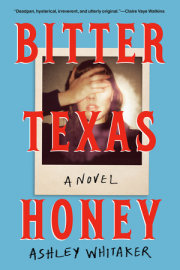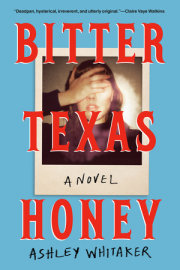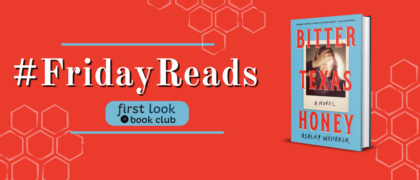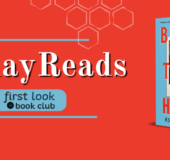1.
Canon
Conservative talk radio hosts were the most reliable men in her life. Monday through Friday, no matter what she'd gotten into the night before, they were there, like old friends and confidants, like second fathers, like faithful lovers, their voices booming and authoritative, clever and jovial and worldly, always ready to soothe her mind and silence her thoughts.
Joan listened one morning, in January 2011, while she got dressed for her internship, tucking a button-up blouse into control-top pantyhose, sliding on her black pencil skirt, and dry heaving into her sink. She continued listening as she walked the four blocks uphill to the Texas Capitol, her head throbbing, chugging a sugar-free Red Bull, with two more cans clanking in her purse for later. She listened intermittently throughout her five-hour shift as she tried to piece together the events of the night before, reading through a thread of unsettlingly intimate text messages between her and a man saved in her phone only as "Marine-Dirty 6th." She resumed listening as she packed up her things and left, heading to a coffee shop near campus, where she intended to work on her novel. Because more than anything else, Joan West was still a writer, or at least she hoped to be.
She walked in the harsh cold, earphones in, a lobbyist-gifted scarf wrapped around her neck. Her favorite host, Dennis Prager, was talking again about the inherent differences between men and women. Every Wednesday, Dennis dedicated his entire second hour-called "The Male/Female Hour"-to traditional gender roles and healthy marriages. Even though Dennis was already on his third wife, Joan trusted his advice wholeheartedly. He seemed so wise and confident, often citing his experience counseling young couples as a rabbi. By listening to his show, Joan hoped to uncover the mysterious reason she always failed in love.
Dennis insisted that the Left was working hard to destroy America by downplaying the obvious, natural differences between the sexes. Joan would have thought he was being paranoid if she hadn't experienced it herself. During her first semester of college, at the University of Miami, Joan learned in Sociology 101 that there was no real difference between men and women. Rather, she had been socialized by the patriarchy (and her parents) to like pink, to play with dolls, to become clingy after sex, etc. Learning this, Joan tried hard to free herself, to embrace her inner manliness. She went braless in dinosaur T-shirts, stopped shaving, and cut her hair short. She went to drum circles on South Beach, topless, and kissed girls. She had emotionless sex with her platonic guy friends, mostly student musicians in the jazz program. She wrote ultra-minimally, like Ernest Hemingway or Bret Easton Ellis. But instead of making her feel empowered or fulfilled, Joan's behavior only led her to an amphetamine-induced manic episode, a forced year off from college, and an HPV diagnosis.
When Joan reached the Drag, Dennis was explaining that women’s denial of their God-given nurturing roles and attempt to enter the man’s sphere had led to an entire generation of depressed women and confused men, which, passing by a bus stop full of miserable-looking UT students, Joan felt was a compelling theory. Now that Joan was aware of this omnipresent, nebulous mass called the Left and its nefarious motives, she was on alert for it at all times.
She passed by the iconic "Hi How Are You" frog mural, then the Church of Scientology, where a cluster of redheaded runaways known colloquially as "Drag rats" were gathered with their dogs, playing banjo and fiddle music, wearing dirty army fatigues, probably high on heroin. One of the Drag rats approached Joan, demanding money. She ignored him, turned up Dennis Prager, and walked faster. Dennis was certainly right about one thing: Something was seriously wrong with her generation.
She entered Caffè Medici, her cheeks flushed from the cold, and went to the bar, where her favorite barista, Roberto, was working. She removed her earphones and scarf and set her phone facedown, careful to conceal the screen from him, lest he get a glimpse of what she was listening to. She ordered a glass of red wine, pulled Ernest Hemingway's collected stories out of her book bag, and began reading with the cover prominently displayed. Every couple of minutes she used a mechanical pencil to mark passages that felt important or profound.
"What's up, lady? What are you reading?" Roberto asked, setting the wineglass in front of her on top of a napkin. "Oh, I love that book."
Joan had first met Roberto while she was studying for finals the month before, in December, shortly before graduating from UT. They rarely spoke, but he possessed a mysterious, subdued earnestness toward life that intrigued her. He called her "lady," which wasn't anything special. He called all the female patrons "lady."
"You've read this?" Joan asked.
"Of course. The second story is the best one in there. I love the part where the guy bleeds to death after getting impaled by that fake bull."
"I love that part too," Joan said, straightening in her seat. And this was true, from what she could remember of the scene. She hardly remembered much of what she read, perhaps because she was usually high. But she did recall that particular image: the man in Spain dying in a pool of his own blood.
She watched Roberto as he made a latte. He was wearing the same jeans he always wore, and a pearl-snap cowboy shirt that was at least a size too small and barely grazed his belt line. Joan wondered if it was meant to be a woman's shirt. She took a large gulp of bitter wine, hoping her heart would begin to beat more slowly. Joan had chugged all three of her Red Bulls during her shift at the capitol, where she was a legislative intern for one of the most conservative members of the state house, an ex-cop from Houston with tall crispy hair who wore yellow alligator-skin boots every day. The boots had been a personal gift from Governor Rick Perry, she was often reminded.
The job began earlier that week and would last through May. The legislature in Texas only met once every two years. Even though the job was unpaid, it was extremely easy and made her feel that she was one step closer to adulthood. It also greatly appeased and impressed her family, who had agreed to continue paying her exorbitant downtown rent.
Halfway into her first glass of wine, Joan ordered another. After Roberto finished serving his other customers, they continued to talk about literature. To her surprise, it seemed as if Roberto had read just about every book ever written. There was nothing Joan had read that Roberto hadn’t, and she began to feel inadequate. She was on her third glass when she revealed that she was a fiction writer, and Roberto told her that he was too. They exchanged email addresses before she left and vowed to start sending each other stories.
Roberto’s first email arrived later that night. Joan was sitting cross-legged in an orange velvet chair, smoking black resin out of her pink pipe, waiting for her dealer to arrive with fresh weed.
The email was short and contained a link to his story "Moshing Towards Bethlehem," which had been published the previous fall in an obscure online journal called Possum Stinkdom. Joan felt mildly ashamed that she didn't have anything published to share. She skimmed a few paragraphs before getting distracted, her mind consumed by thoughts of what she should send Roberto in return. She wanted to impress him, to appear as prolific and assured as he was.
"What do you think I should send to this writer guy?" Joan asked her roommate, Claire, who was standing at the window, drinking chardonnay, watching a concert through the blinds. Of Montreal had just started playing on the outdoor stage at Mohawk, one of three music venues next door. The bass was so loud it shook the entire building. The laminate floor vibrated. The dishes rattled in the cabinets.
Claire stood for a moment, considering. "What about something with your dad? That material is always pretty strong."
"That could work, I guess," Joan said. She mostly respected Claire's opinion. They had met at Oxford two summers before, during a Jane Austen study abroad through the UT English Department, where they drank more, and more often, than any of the other girls in the program. Claire was also a writer, working on an epic one-day novel in the style of Ulysses.
Claire did a ballerina move into the kitchen, where she picked up her oversized wine bottle sitting half empty on the counter. She filled her glass nearly to the brim, then topped it off with a dash of sparkling water. Claire did this, she often explained, to "pace" herself. She walked back into the den with her glass and examined her profile in Joan's full-length antique mirror.
"I hope I threw up last night," Claire said, sucking in and placing her hand on her lower stomach.
"I'm pretty sure you did," Joan said. She opened her laptop and began searching her chaotic desktop for the latest draft of her coming-of-age novel, Cowgirls and Indians, which she'd begun writing in Miami, and from which she would extract an impressive stand-alone piece about her dad. Opening the document increased her heart rate and shortened her breath. The muscles in her chest and neck tensed up. As much as Joan wanted to be a writer, she didn't actually enjoy the process of it, and hadn't since she quit Adderall three years before, at the behest of her parents. Without amphetamines, Joan wasn't sure why she bothered with writing. It was as if she was trying to fill some deep void, the origins of which she chose not to explore.
"Are you coming out tonight?" Claire asked. "Luke's playing at Cheer Ups." Luke was Claire's on-again/off-again boyfriend of four years.
"Not tonight," Joan said. "I'm pretty tired." The truth was that her dealer would be over any minute, and she didn't want to miss his delivery.
"Fine. Let's at least get a picture," Claire said. The girls took a stoic-faced selfie and posted it to Facebook, with the caption "Great American Novels Coming Soon."
Claire left, her dealer came and went, and Joan remained in her chair with her laptop open, Roberto's story languishing on the screen, unread. Joan smoked a second bowl while looking out her windows, admiring her view. From her corner apartment, she could see so much: the top tip of the capitol, the skyline, the sleek-looking homeless shelter. She zoned out for a few minutes, entranced by Club de Ville's blinking, crown-shaped sign directly across the street. Feeling high and renewed, Joan wrote a quick response to Roberto.
This was amazing, she wrote, even though she hadn't finished reading his story. Love the homage to Joan Didion. Very subversive.
Thanks, lady, he replied ten minutes later. That really means a lot. Hope to see something of yrs soon.
Joan scrolled through her novel for compelling scenes about her dad, narrowing her choices down to three pieces, weighing them against one another. There was a chapter that chronicled the events of her dad's fourth and most recent marriage, which had ended explosively in 2009, while she was in Oxford with Claire. There was a heart-wrenching vignette about her dad's Chihuahua (the lone remnant of said fourth marriage) ingesting antifreeze and almost dying. Alternatively, she could go with one of her very first pieces, a lyrical dramatization of her dad sinking his houseboat in 1990, on Lake Lewisville, with his fuckup friend Bruce, shortly after her parents' divorce when she was three.
Her dad had always been a major focus of her writing. His life was chaotic and interesting, for better or for worse. He made a compelling character. Joan had never written a word about her mother, though, who she didn't feel had any literary merit.
She decided to send Roberto the chapter about her dad's fourth marriage, which had received a B+ in her intermediate fiction class at UT. It was called "Blond Hair, Big Boobs, Alcoholic, Thief."
She sent the piece without providing any context, making any changes, or checking for any typos and anxiously awaited his reply.
Roberto’s response came the following morning while Joan was at work, proofreading a bill that would require proper burials for aborted fetuses. She paused her task immediately to read his note:
Lady,
Thank you for sharing this piece, which I thoroughly enjoyed. I admired the way this narrator chronicles her dad's relationship from beginning to end with such clarity and precision.
However, I couldn't help but want to see more of her interiority. There is this sense that she is not more than a camera lens, recording her dad's movements. Perhaps you could deepen this character somehow, write a story that reveals more of her inner life-her thoughts, emotions, and desires.
I look forward to reading more. You are a very talented woman with a distinct voice.
Yrs, R
Joan reread the email several times, lingering over the final sentence. She was a very talented woman with a distinct voice. She found this line immensely flattering and was pleased to have Roberto taking her work seriously, engaging with her mind and soul in a way that she missed. Ever since graduating in December, Joan lacked an authoritative male mentor to assure her that she had talent, to remind her that her life was worth living, her dreams of being a writer worth pursuing.
Joan started drinking wine at the coffee shop more over the next two weeks, often walking or driving straight over from her internship. The excitement of the Eighty-Second Legislative Session-the Tea Party activists and their causes, along with all the lobbyist-funded buffets, open bars, mariachi bands, petting zoos, and interpretive dances-drained Joan artistically. She retreated to the coffee shop afterward, she told herself, to refill her creative well. Really, she wanted to fill herself with Roberto.
She brought a different book to read each time she visited, to study how famous writers handled "interiority," and to show Roberto how sophisticated and varied her taste was. One Friday, in the last week of January, she brought Flannery O'Connor's Everything That Rises Must Converge.
"Ugh. Flannery O'Connor. She's the worst," Roberto said dismissively before loudly grinding a batch of beans.
Joan was noticing a pattern with him. While he'd read every book she brought in, the authors seemed to fall into only two categories: Either they were "the best," or they were "the worst." There was no gray area with Roberto. Joan envied his conviction. If she was being honest, she never knew exactly what to feel about any book she read.
Copyright © 2025 by Ashley Whitaker. All rights reserved. No part of this excerpt may be reproduced or reprinted without permission in writing from the publisher.






